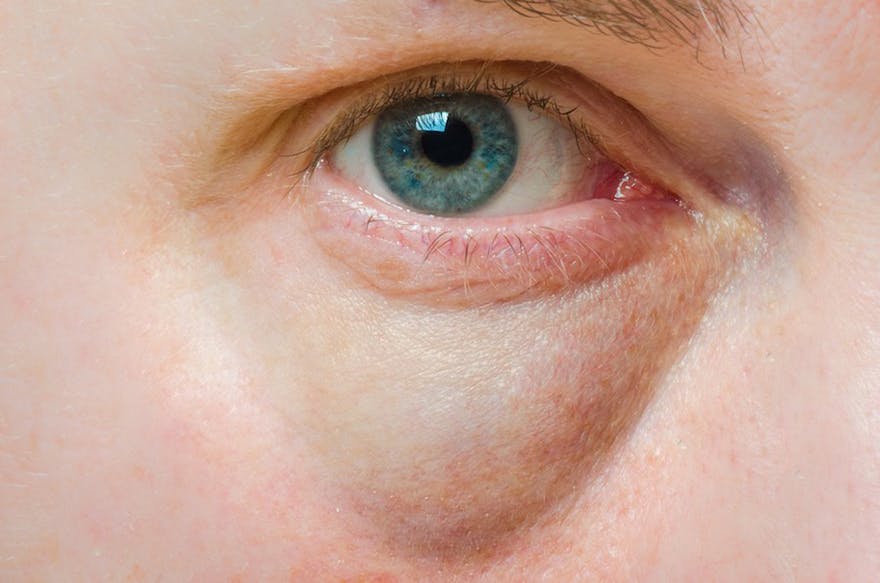Eye injury: Tips to protect vision
HEALTH & WELLNESS
10.21.2014

When you think about who's at risk of eye injury, you probably picture workers in a factory or on a construction site. And indeed many eye injuries happen on the job. But almost as many happen around the home. All it takes is a flying champagne cork or a shooting rubber band. Fortunately, most eye injuries are preventable. Take simple steps to reduce the risk of an eye injury and understand when to see a doctor.
What can you do to prevent an eye injury?
To prevent an eye injury around the home, follow these safety tips:
Wear protective eyewear during risky activities. Wear safety glasses with side shields anytime you might be exposed to flying particles, objects or dust. Wear goggles when exposed to chemicals — even if you're just a bystander. Protective eyewear counts during sports, too. Any sport featuring a ball, racket or flying object poses a potential risk of eye injury.
Use caution with chemicals and cleaners. Carefully read the labels of chemicals and household cleaning supplies, such as bleach, before using them. Don't mix products. Keep all chemicals and sprays out of a child's reach.
Supervise your child's use of tools. Pencils, scissors, forks and knives can all cause serious eye injury. Keep in mind that common household items — such as paper clips, bungee cords, wire coat hangers, rubber bands and fishhooks — also can be dangerous.
Avoid certain children's toys. Don't allow your child to play with nonpowder rifles, such as pellet guns or BB guns. Avoid projectile toys, such as darts, bows and arrows, and missile-firing toys.
Don't allow your children to use laser pointers. Laser pointers, especially those with short wave lengths such as green laser pointers, can permanently damage the retina and cause visual loss with exposures as short as a few seconds. As an adult, be cautious when using laser pointers. Avoid directing the beam toward anyone's eyes.
Be careful when cooking or using hot objects. Use grease shields to prevent the splattering of hot grease or oil. Avoid using a curling iron near your eyes.
Eliminate hazards that may cause falls. Secure rugs and railings. Consider covering sharp furniture edges and corners with a cushioning material, especially if a child or elderly adult lives in your home.
Forgo backyard fireworks. Leave fireworks to trained professionals.
Take caution when opening a champagne bottle. Don't shake the bottle. Point the bottle at a 45-degree angle away from yourself and any bystanders. Firmly place your palm over the cork while removing the wire hood. Place a towel over the entire top of the bottle, grasp the cork and slowly twist the bottle until the cork is almost out of the neck. To prevent the cork from being discharged like a missile, maintain slight downward pressure on the cork just as it comes out of the bottle.
Use car seats. Make sure your child is properly secured in a car seat and that the seat belt or shoulder belt fits tightly. Don't allow a child age 12 or younger to ride in the front seat. Store loose items in your trunk or secure them to the floor of your vehicle.
What are the signs and symptoms of an eye injury?
It's not always easy to identify an eye injury — especially in a child. Seek medical care immediately if you notice any of these signs or symptoms:
Obvious pain or trouble seeing
A cut or torn eyelid
One eye not moving as well as the other eye
One eye sticking out farther or seeming more prominent than the other
An unusual pupil size or shape
Blood in the white part of the eye
An object on the eye or under the eyelid that can't easily be removed
What can you do if an eye injury occurs?
When an eye injury occurs, seek medical help from an ophthalmologist or another doctor as soon as possible — even if the injury seems minor. Delaying care could lead to permanent vision loss or blindness. In addition, take simple steps to prevent further damage. For example:
Don't touch, rub or apply pressure to the eye
Don't try to remove an object that appears stuck on the surface of the eye or an object that appears to have penetrated the eye
Don't apply ointment or medication to the eye
Flush out any chemicals the eye has been exposed to with plenty of clean water
Gently place a shield or gauze patch over the eye until you can get medical attention
An accident can happen in the blink of an eye. Being prepared — both through prevention and quick action in case of an emergency — can help keep you and your loved ones seeing clearly.
©1998-2013 Mayo Foundation for Medical Education and Research (MFMER). All rights reserved. Terms of Use
Image Credits: Roblan/Shutterstock.com
Recommended Articles
The 5 Best Foods That Will Help Supercharge Your Brain
Amidst our busy schedule, it's important to retain our focus and memory. Resting alone is not...
Iron deficiency is a lot more common than you would think. A recent survey by SATA CommHealth(i...
Mars vs Venus: Understanding the His and Hers of Nutritional Needs
Mars vs Venus: Understanding the His and Hers of Nutritional Gaps Although their DNAs are...






